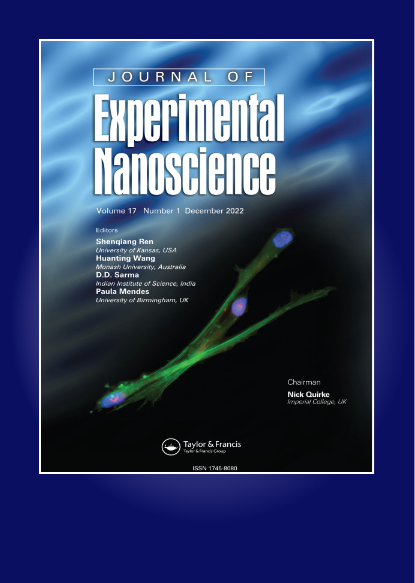Development and butyrylcholinesterase/monoamine oxidase inhibition potential of PVA-Moringa oleifera developed nanofibers
IF 2.8
4区 材料科学
Q2 CHEMISTRY, MULTIDISCIPLINARY
引用次数: 3
Abstract
Abstract The objective of the current research was to study the effects of polyvinyl alcohol (PVA) electrospun nanofibers loaded with different concentrations of leaf extract of Moringa oleifera (MO) on butyrylcholinesterase (BuChE), monoamine oxidase A (MAO A) and monoamine oxidase B (MAO B) enzymes. The MO-loaded PVA nanofibers were investigated for their inhibitory effect on BuChE and MAO A & B enzymes. The characterization of the fabricated nanofibers was performed by using SEM, FTIR and XRD. The results showed that increasing the concentration of MO, the enzyme inhibition capability of electrospun nanofibers was greatly (p < 0.05) influenced. This study involved the fabrication of electrospun nanofibers of PVA containing four different concentrations of MO (0%, 0.1%, 0.2% and 0.4%). The SEM micrographs revealed that all the nanofibers were porous, beadless and smooth. At a high concentration of M. oleifera, uniform fibers were obtained. The FTIR results of the fabricated nanofibers revealed that chemical interaction did not take place between M. oleifera and polyvinyl alcohol. The results reveal that with an increase in the concentration of M. oleifera (MO), the enzymes inhibition capability of electrospun nanofibers is greatly influenced. Different concentrations of MO extract were successfully loaded to the MMT-reinforced, glutaraldehyde-cross-linked nanofibers.PVA辣木纳米纤维的开发及其对丁酰胆碱酯酶/单胺氧化酶的抑制潜力
摘要本研究旨在研究负载不同浓度辣木叶提取物的聚乙烯醇(PVA)电纺纳米纤维对丁酰胆碱酯酶(BuChE)、单胺氧化酶A(MAO A)和单胺氧化酶B(MAO B)酶的影响。研究了负载MO的PVA纳米纤维对BuChE和MAO A&B酶的抑制作用。利用SEM、FTIR和XRD对制备的纳米纤维进行了表征。结果表明,随着MO浓度的增加,电纺纳米纤维对酶的抑制能力显著提高(p < 0.05)影响。本研究制备了含有四种不同浓度MO(0%、0.1%、0.2%和0.4%)的PVA电纺纳米纤维。SEM显微照片显示,所有纳米纤维都是多孔、无珠和光滑的。在高浓度的油下,可以获得均匀的纤维。所制备的纳米纤维的FTIR结果表明,油和聚乙烯醇之间没有发生化学相互作用。结果表明,随着油(MO)浓度的增加,电纺纳米纤维对酶的抑制能力受到很大影响。将不同浓度的MO提取物成功地负载到MMT增强的戊二醛交联纳米纤维上。
本文章由计算机程序翻译,如有差异,请以英文原文为准。
求助全文
约1分钟内获得全文
求助全文
来源期刊

Journal of Experimental Nanoscience
工程技术-材料科学:综合
CiteScore
4.10
自引率
25.00%
发文量
39
审稿时长
6.5 months
期刊介绍:
Journal of Experimental Nanoscience, an international and multidisciplinary journal, provides a showcase for advances in the experimental sciences underlying nanotechnology and nanomaterials.
The journal exists to bring together the most significant papers making original contributions to nanoscience in a range of fields including biology and biochemistry, physics, chemistry, chemical, electrical and mechanical engineering, materials, pharmaceuticals and medicine. The aim is to provide a forum in which cross fertilization between application areas, methodologies, disciplines, as well as academic and industrial researchers can take place and new developments can be encouraged.
 求助内容:
求助内容: 应助结果提醒方式:
应助结果提醒方式:


